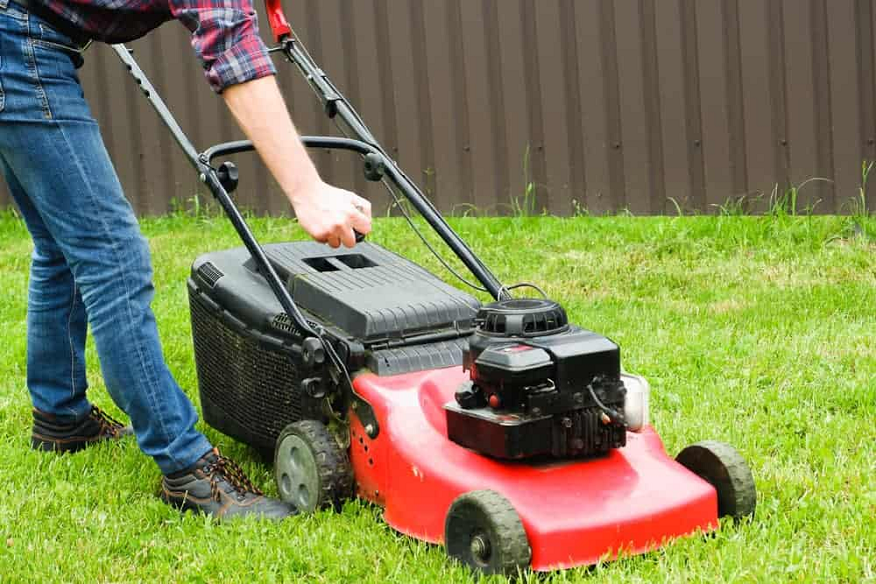Are you tired of the constant maintenance, noise, and frustration that comes with owning a lawn mower? Well, you’re not alone. Many homeowners find themselves wondering how to get rid of their old lawn mower and free up some valuable space in their garage or shed. Whether you’re looking to sell it, donate it, or recycle it responsibly, this blog post will guide you through the various options available. So grab a cup of coffee (or your beverage of choice) and let’s explore the best ways to bid farewell to your faithful grass-trimming companion!
Why Get Rid of a Lawn Mower?
Tired of spending your weekends pushing a noisy, gas-guzzling machine around your yard? Ready to say goodbye to the constant repairs and maintenance that come with owning a lawn mower? There are several reasons why you might want to get rid of your old grass-cutting companion.
If you’ve recently switched to a professional lawn care service or hired a landscaping company, keeping your own mower may no longer be necessary. Why go through the hassle of storing and maintaining it when someone else can take care of your lawn for you?
If you’re downsizing or moving into an apartment or condo where there’s no need for a personal lawnmower, getting rid of it makes perfect sense. Save yourself the trouble of finding storage space in cramped quarters.
Perhaps you’ve decided to embrace alternative landscaping methods like xeriscaping or installing artificial turf. In these cases, having a traditional lawn mower becomes obsolete.
Whatever your reason may be, rest assured that there are plenty of options available for parting ways with your trusty grass cutter. From selling it to donating it or even recycling its components responsibly – we’ll explore all these possibilities in this blog post! So keep reading and discover which method works best for you.
Selling Your Lawn Mower
When it comes to getting rid of your old lawn mower, one option that may come to mind is selling it. Selling your lawn mower not only helps you clear up space in your garage or shed, but it also allows someone else to benefit from its use.
One way to sell your lawn mower is through online platforms such as Craigslist or Facebook Marketplace. These websites provide a convenient and accessible platform for buyers looking for used lawn mowers. Be sure to take clear and detailed photos of your lawn mower, highlighting any special features or accessories that may increase its value.
Another option is to have a yard sale or participate in a local community flea market where you can showcase and sell your used equipment. This can be a great opportunity to interact with potential buyers directly and negotiate the price if needed.
Additionally, consider reaching out to friends, family members, neighbors, or coworkers who might be interested in buying a used lawn mower. Word-of-mouth recommendations often lead to successful sales.
Remember that pricing plays an important role when selling any item. Do some research beforehand by checking similar models’ prices online or asking around for advice on how much you should ask for your specific model.
Selling your old lawn mower not only benefits you financially but also ensures that the equipment continues serving its purpose rather than ending up in a landfill unnecessarily. So why not give someone else the chance to maintain their own beautiful garden while putting some money back into your pocket?
Donating Your Lawn Mower
If you’re looking for a way to give back to your community and help those in need, donating your lawn mower is a great option. By doing so, you can not only get rid of your unwanted equipment but also provide someone else with the means to maintain their own yard.
One option for donating your lawn mower is to reach out to local charities or non-profit organizations that accept donations of used tools and equipment. These organizations may have programs in place that distribute donated items to individuals or families who are unable to afford their own lawn care equipment.
Another option is to check with local schools, community centers, or vocational training programs that offer landscaping or gardening classes. These institutions often rely on donations from the community to provide hands-on learning experiences for their students.
You could also consider posting an ad on online classified websites or social media platforms offering your lawnmower as a donation. Many people who are just starting out or facing financial difficulties would greatly appreciate this kind gesture.
Remember, when donating your lawn mower, it’s important to ensure that it’s in good working condition and includes any necessary accessories such as power cords or gas cans. This will increase the likelihood of finding someone who can make use of it.
By choosing to donate rather than discard your old lawn mower, you’re not only helping someone else but also reducing waste and promoting sustainability within your community. So why not give back by giving away?
Recycling Your Lawn Mower
When it comes time to part ways with your trusty old lawn mower, recycling is a fantastic option. Not only does it help reduce waste and protect the environment, but it also gives new life to valuable materials that can be used in the manufacturing of other products.
To recycle your lawn mower, start by checking if there are any local recycling centers or programs that accept small engines. Many cities have designated drop-off locations where you can safely dispose of your old mower. Some manufacturers even offer take-back programs, so be sure to check with the brand of your lawn mower.
Before taking your mower in for recycling, make sure to drain all fluids such as oil and gasoline properly. These substances should never end up in landfills or water sources as they can be harmful to the environment.
Once you’ve prepared your lawn mower for recycling, transport it safely using a sturdy vehicle or trailer. If needed, consider contacting a professional hauling service that specializes in large item removals.
Remember that when you choose to recycle your lawn mower instead of throwing it away, you’re contributing to a more sustainable future – one where resources are conserved and reused wisely.
By opting for recycling over landfill disposal, we can all play our part in creating a cleaner and greener world for generations to come!
Conclusion
Getting rid of a lawn mower doesn’t have to be a hassle. Whether you’re looking to sell, donate, or recycle your old machine, there are options available that can help you dispose of it responsibly.
Selling your lawn mower is a great way to recoup some of the cost and put it towards a new one if needed. Online marketplaces and classified ads can connect you with potential buyers who may be interested in purchasing your used equipment.
If selling isn’t an option for you, consider donating your lawn mower instead. Many charitable organizations and community centers would appreciate receiving functional tools like this to support their programs or assist individuals in need.
When all else fails, recycling should be your go-to choice. Lawn mowers contain various materials that can harm the environment if not disposed of properly. Check with local recycling centers or contact waste management facilities to find out how they handle small engine disposal.
Remember, getting rid of a lawn mower responsibly not only benefits the environment but also contributes to sustainable practices within our communities. By choosing one of these methods rather than tossing it into the trash, we can make a difference and ensure that our old machines find new life elsewhere.
So next time you find yourself needing to part ways with your trusty grass-cutting companion, keep these options in mind. Sell it for some extra cash or donate it for someone else’s use—either way, don’t forget about recycling as a last resort!
It’s time to bid farewell to that old lawn mower and say hello to cleaner yards and greener choices!

